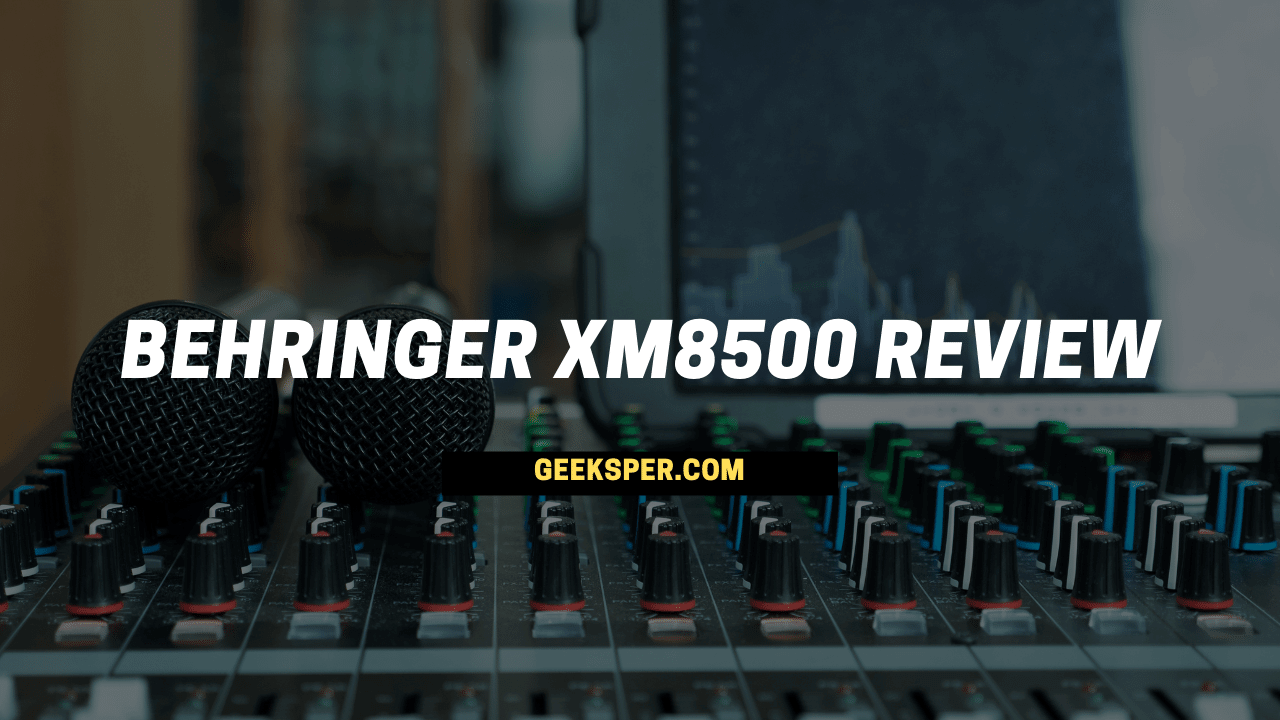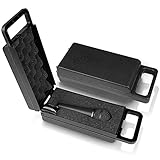A handheld mic can be your best friend when you have a good voice, and you know how to control it with the use of the best suitable microphone. The Behringer XM8500 is a Dynamic Cardioid Handheld Microphone that serves the best purpose with an excellent value for saving as well as providing quality audio recording too.
It is a very good and well-built microphone having a durable construction with its metal-based body and reinforced connections. This is the best option as a handheld microphone because it is reasonably priced for the features that it offers.
In this blog post, I will Behringer XM8500 Review which is a dynamic cardioid microphone with its features, pros, and cons.
Behringer XM8500 Detail Review
Behringer XM8500 would be my personal favorite for a low-cost dynamic microphone because this Mic is awesome for several reasons, all of which are very impressive. There is something amazing about this mic as it is amazing all around constructed as excellent, proficient, and solid.
- Cardioid characteristic with excellent feedback suppression
- Two-stage pop filter minimizes breath and pop noises
- Shock mount system reduces handling noise
- Extremely high signal output lets your voice cut through
Quality
You can see the sturdiness in its full metal development. The large portion of 8 ounces of the XM8500 is a strong microphone, which feels significant in the palm and is also easy to carry. It can easily be a two-hander when you’re truly dedicated to a note for recording the music. The gold-plated point for the XLR cable is thick and strong.
Body and Grip
A dark matte rugged finish covers an unbalanced metal body that gives it good width until it arrives at a reasonable headrest for the mic. The matte dark theme of the body of this mic is extreme and impervious to scratches while also providing a good grip on your hand.
The nature of the completion reaches out onto the mic head, where it carefully wraps the cross-section of the cardioid polar example. A metal ring separates the upper and lower part of the mic head, and it has a similarly attractive matte finishing. This causes the mic to reflect less light when it is used in studios or concerts where there are lots of lights flashing around.
Performance
The Behringer XM8500 has an implicit suspension for noise reduction and an inside shock mount that works really well for taking care of commotion. You just get the sound of your voice clearly recorded with this mic. A two-step pop channel reduces any vibrations and mechanical sound along with any air disturbance. You can speak and blow as much as you want with this mic. It will just get the sweet vibrations.
Frequency Range
The frequency range of this mic lies in the 50 Hz to 15 kHz range which is adaptable across almost the entire capacity of hearing by human beings and is ideally suited for getting the main part of the vocal range. What detract from this is that the Behringer XM8500 has the elements that matter and will have an effect on your voice display.
Behringer XM8500 Specs
Before we move on to the detailed look of this mic, we see the complete specification of this microphone first.
| Microphone | Behringer XM8500 |
| Type | Dynamic |
| Polar Pattern | Cardioid |
| Audio frequency bandwidth | 50 – 15,000 Hz |
| Connector | XLR |
| Sensitivity | 28 mV/Pa |
| Weight | 240 g |
| Buy On | Amazon |
Pros and Cons of Behringer XM8500 Microphone
Behringer XM8500 vs Shure SM58
Both Behringer and Shure are advanced companies that produce very useful microphones. The Shure SM58 is an amazing cardioid pattern microphone that can record voices very well. But if you compare Behringer XM8500 with Shure SM58, then here is the difference.
• The Behringer XM8500 mic is warmer than the Sm58’s, and it is marginally louder as well.
• The Behringer XM8500 is less inclined to input. What I mean by that is, the Gain can be wrenched somewhat higher without getting input, and furthermore, the XM8500 is less delicate to mic position in the room than the SM58.
• The Shure SM58 has a slight low in the mid/high-mid reach. Nonetheless, XM8500 has the polar opposite; for example, it has scooped in the mids/high-mids (contrasted with the SM58) and a slight “Lift” in the lower mids.
• The Behringer XM8500 has more clear top-of-the-line 6k and higher reach. This isn’t really awful Or something good.
• This quality, alongside different features, makes Behringer XM8500 sound better than SM58.
You can also check out in-dept full Shure SM58 Microphone Review.
FAQs (Frequently Asked Questions)
Which mic is better than Behringer XM8500?
Shure SM48 is a microphone that is a bit better than Behringer XM8500 because it is more versatile due to its good recording for the vocals, and it also records instruments well better than XM8500.
How to setup Behringer XM8500?
First, you have to get Behringer XM8500 XLR cable to 3 rings 1/4 inch. It will need a male plug adapter from Flex, and it should be properly plugged in into the microphone. Then you need a PR781 mic profile which is a good place to start. Along with that, you have to use a 20 DB preamp to adjust the levels.
How to connect Behringer XM8500 to PC?
The XM8500 comes with an XLR cable that can be plugged into the 3.5mm mic jack of the computer. This allows the mic to be connected to a PC and work properly after automatically getting installed on the OS.
How to fix Behringer XM8500 fuzz sound?
The fuzz sound is caused by a USB port when a proper cable isn’t used. Consider using a 3.5mm XLR jack cable to reduce this sound.
Conclusion
This was Behringer XM8500 review in detail where I have shared complete details for this microphone and its qualities at such a cheap rate. There are lots of features and benefits in this microphone as compared to other mics, including Shure SM58.
I hope this information about Behringer XM8500 was helpful for you, and you have got the right idea about what this mic is all about and what it has to offer to the customers. Check out some of our other best articles here:
Shure WH20XLR Microphone Review
Fifine K669B USB Microphone Review: Features, Pros, & Cons
MXL 550 Review: Microphone Features, Pros, and Cons
MXL 770 Review: Microphone Features, Pros, and Cons
MXL V63M Review: Microphone Features, Spec, Pros & Cons

